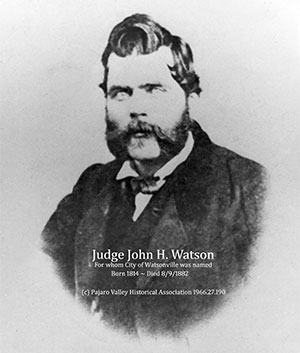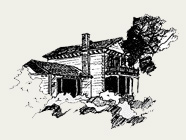 Who was this man John W. Watson whom the town of Watsonville was named after 150 years ago? Watson was born in1814 in Georgia. Accounts differ on the facts surrounding his life. It was reported that he received an appointment to West Point but did not finish. He moved to Texas. During the gold rush he came to California with a slave who soon after arriving bought his freedom.
Who was this man John W. Watson whom the town of Watsonville was named after 150 years ago? Watson was born in1814 in Georgia. Accounts differ on the facts surrounding his life. It was reported that he received an appointment to West Point but did not finish. He moved to Texas. During the gold rush he came to California with a slave who soon after arriving bought his freedom.
When California became a state, Watson was given a post. The first legislature, in San Jose in 1849, created nine judicial districts. Watson was named judge for the district which included Santa Cruz, Santa Clara, Contra Costa, and Monterey. He traveled from county seat to county seat. Judge Watson noticed that attorneys who made the most money were those who defended men accused of grand larceny. In 1851, he resigned from the bench and started practicing law. His first case was defending a man accused of horse stealing, an offense punishable by hanging. Judge Watson lost his case and his client.
In the fall of 1852, Watson and D.S. Gregory bought from the heirs of Alexander Rodriguez the Bolsa del Pajaro Rancho and started a settlement on the road from Santa Cruz to San Juan Bautista.
In November 1852, L. Thrift opened a hotel in a tent. The following spring brought an influx of settlers attracted by the stories of rich harvests from the fertile Pajaro Valley. Watson and Gregory rented tracts on shares. During this time the entire area was cultivated in potatoes and the prices were high. Other parts of California had also planted potatoes and the bottom soon fell out of the potato market. The town still continued to grow. Cooper & Company of Santa Cruz opened a branch store, another hotel appeared and a post office was established. Mr. Thrift was named postmaster. Other stores and two churches were soon built.
Watson was elected to the state senate in 1859. After serving his term in Sacramento, he never returned to Watsonville. Instead he went to Nevada, caught up in the Washoe mining excitement. John W. Watson died in Nevada on August 8, 1892.
